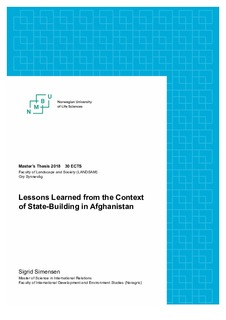| dc.description.abstract | State-building is a popular approach to help states out of state weakness and state failure. Yet, state-building efforts have a long way to go to achieve desirable results. Reasons for inadequate state-building success have been discussed and assessed by many scholars before me. Commonly, lack of success is blamed on deeply embedded traditional structures, patronage politics and persistent insurgency.
Fragile and Conflict Affected States (FCASs), where state-building measures are adopted, generally suffer from various internal problems, such as high levels of poverty, violent conflicts, derailed economies and widespread illiteracy. Conducting state-building in FCASs is therefore a difficult task. In Afghanistan, different state-building efforts by various national and international actors have been conducted for nearly two decades, yet Afghanistan still suffers from high levels of insurgency, weak democratic institutions and a weak economy.
Through a case study of state-building efforts in Afghanistan, this research explores what impact Afghanistan´s local context has had on state-building efforts. Moreover, the study analyses how different stakeholders contributes to state-building and to what extent they acknowledge local context when carrying out certain state-building efforts. The thesis reveals that state-building efforts in Afghanistan have not been tailored adequately to the local context, and that this has constrained state-building´s success. Deeply embedded traditional structures and forms for governance have been a major challenge to the goals envisioned by state-building policies. The thesis explains then how future state-building policies can benefit from using local context as a starting point and discusses whether traditional structures and patronage politics can be used as an asset in state-building efforts. | nb_NO |

